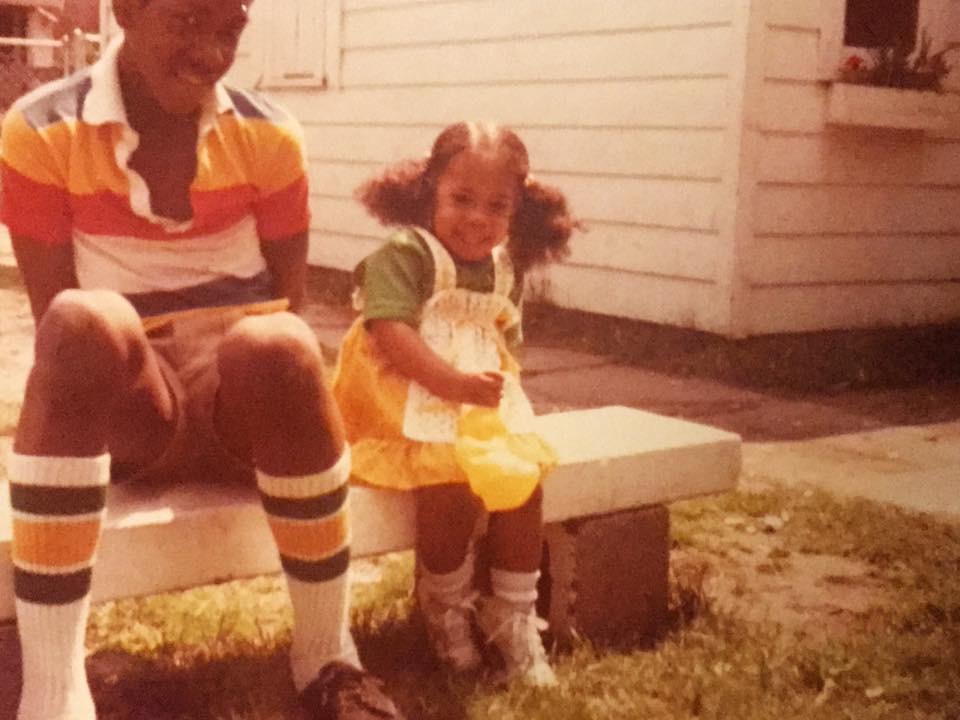Life In First Person: Kristin Wright
Text: Kristin Wright
Sitting on our grandparents’ bench in Detroit in 1980, little did I know, that one day trying to help my brother Michael live a life, rather than just an existence would be the hardest thing I have ever done. Such simpler times in that backyard.
My brother Michael is 52. He lives with mental illness and intellectual disability. He spent most of his life at home. Our beautiful grandmother made his every meal and kept him close, away from the danger in the streets of the city through his teen and young adult years in the 1980s. Our mother worked. As the years went on, Michael's obvious challenges were not defined in our family. They were not spoken. I felt embarrassed that he was different. My older brother was simply "Michael."
I can see him now, peering out of the windows of our grandparents’ home, watching my mother and I pull in the driveway from after-school activities, various errands, from life. For decades, after managing to graduate from high school, Michael watched the rest of the world go by. I wish I could see inside Michael’s mind, complexly burdened by schizophrenia and an IQ of only 40.
Stigma is very real and dangerous. For us, family shame and turning the other way have had nearly catastrophic consequences. Decades of conceding to societal stigma combined with a truly broken mental health system have left me and Michael with few options.
Today, I am walking the most uncertain, difficult, and long path to find and access appropriate, safe housing and supports for Michael. We are making progress, but the phone calls, emails, paperwork, and difficult decisions are endless. The emotional toll is heavy. My brother’s dual diagnosis of schizophrenia and intellectual disability is especially challenging. As a mother of two small children, I cannot do it alone.
When I took over responsibility of Michael’s care from our mother in 2017, the sad and harsh realities of the mental health system came crashing down around me. I was speechless when social workers explained there was no place for Michael, no immediate place to turn for housing to meet his needs. I was speechless when a psychiatrist discharging Michael from the hospital suggested I put him in a motel to live. I was speechless when a different psychiatrist suggested a homeless shelter. If I followed such advice, I believe my brother would be dead.
Mental health cannot wait. I urge families to let go of stigma now, and move past denial. Speak it. Seek treatment early. Find the best information and smartest resources to help loved ones as soon as possible. Appreciate allies. Ask questions. Go back to the people who know the answers. Keep calling. Email too. Complete the repetitive forms and applications. Cry and repeat. Processes are confusing, daunting, bureaucratic, and slow. Advocate now, not later. Like other diseases, mental health is a matter of life or death.
As a country, we cannot perpetuate what amounts to cruelty to some of our most vulnerable citizens. The mentally ill are too often cast aside because of stigma and scarce resources available to help them. We must be willing to ask ourselves how an already insufficient and strained mental health system will address the increased awareness and prevalence of mental illness in the years quickly coming.
Alongside that awareness and compassion, funding in state and federal budgets may just be the most critical piece of the puzzle. We need families to continue to push for better. We need lawmakers to draft and pass legislation that protects and serves people who live with mental illness. We need leadership across government, the medical community, and the nonprofit world to stand up.
Michael and I are formidable players in this fight. If you ever have the chance to meet him, you'll quickly notice he loves to talk, and he has a lot of questions. He will without a doubt ask you his favorite ones: "Do you have a job?" "How did you get your job?" and "Who taught you how to drive?" And just know, he will ask you the same questions every time he sees you. Michael still asks me and I still tell him about learning to drive at ABC driving school when I was 15. (Again, simpler times.) It is endearing, but my brother’s questions are far more than simple curiosities. My brother has never had a job. He is not able to drive. In the most spoken yet unspoken way, Michael's favorite questions reflect his desire to feel the sense of self-worth that often comes with having a job; to feel the sense of independence we take for granted sitting behind the wheel; to feel a sense of some sort of accomplishment. With his every question, my brother finds a way to never let us forget that he is still patiently waiting for life, rather than just an existence.


